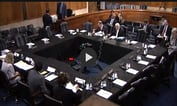 We use specialists for many tasks in everyday life. Perhaps, rather than squeeze financial pros under a uniform umbrella, it might be better to admit to the reality of a rainbow of umbrellas, each designed for a specific circumstance. (Photo: Shutterstock)
We use specialists for many tasks in everyday life. Perhaps, rather than squeeze financial pros under a uniform umbrella, it might be better to admit to the reality of a rainbow of umbrellas, each designed for a specific circumstance. (Photo: Shutterstock)
Airing on March 2, 1962, the 24th episode of Twilight Zone’s third season was entitled “To Serve Man.” You might remember this now-famous show for featuring Richard Kiel – who would later play Jaws in James Bond movies – as the mysterious alien Kanamit who comes to Earth with technology that rids the world of all things bad.
The plot centers on an alien book whose title “To Serve Man” is interpreted benevolently (i.e., to help humans).
In the end, and too late, it’s discovered to be a cookbook.
“Clear lines, clear labels,” is what broadcast veteran Pam Krueger told me when I asked her about the SEC’s “Best Interest” proposal (see “Exclusive Interview: MoneyTrack’s Pam Krueger Says It’s Time for Industry and Regulators to ‘Pick a Lane’,” FiduciaryNews.com, Aug. 21, 2018).
The trouble with most regulations is that they’re written by lawyers for lawyers. Spoiler alert: Most people aren’t lawyers. While regulators seem intent on accommodating all fifty shades of grey, retirement savers just want to know “Is this right for me?”
Therein lies the problem. “Is this right for me?” implies a black-and-white answer. Such clarity does not exist. We each have our own wants and needs. We each have our own goals and dreams. No cookie-cutter solution can accommodate the variety of answers inherent in the diversity of individual situations.
Imagine having a medical problem. At first, you seek the advice of a general practitioner. Once the ailment is isolated, you’re often referred to a specialist.









 August 22, 2018 at 04:15 PM
August 22, 2018 at 04:15 PM












 Christopher Carosa, CTFA, is editor of FiduciaryNews.
Christopher Carosa, CTFA, is editor of FiduciaryNews.